CTVNEWS.CA: RICHARD ON Movies to watch when you’re bored
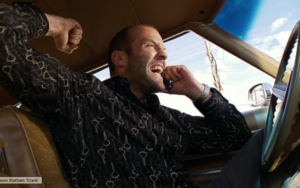 Feeling bored? Here’s a list of supercharged movies to help you fire up the neurons, tweak the imagination and drop kick boredom into the next century.
Feeling bored? Here’s a list of supercharged movies to help you fire up the neurons, tweak the imagination and drop kick boredom into the next century.
Read the whole thing HERE!
 Feeling bored? Here’s a list of supercharged movies to help you fire up the neurons, tweak the imagination and drop kick boredom into the next century.
Feeling bored? Here’s a list of supercharged movies to help you fire up the neurons, tweak the imagination and drop kick boredom into the next century.
Read the whole thing HERE!
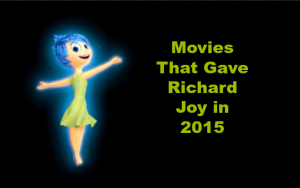 Any year that gives us the eyeball bulging thrills of “Mad Max: Fury Road,” the subtle yearning of “Carol” and everything in between can’t be all bad. Sure, there were some stinkers and more nostalgia than you could shake a lightsaber at, but when I think back on 2015 I’ll remember Max’s pole riders, Lili Tomlin as the world’s fieriest grandmother, “Chewie we’re home,” Leo sleeping inside a horse and “Ex Machina’s” disco dance party.
Any year that gives us the eyeball bulging thrills of “Mad Max: Fury Road,” the subtle yearning of “Carol” and everything in between can’t be all bad. Sure, there were some stinkers and more nostalgia than you could shake a lightsaber at, but when I think back on 2015 I’ll remember Max’s pole riders, Lili Tomlin as the world’s fieriest grandmother, “Chewie we’re home,” Leo sleeping inside a horse and “Ex Machina’s” disco dance party.
BEST MOVIES OF 2015
“The Big Short” is an infuriating movie. Not because it’s poorly made but because it is so well made. It takes years of banking bafflegab and distils it down to the essence in what may be the funniest, smartest and most maddening look at why America’s housing market crashed in 2008.
Based on Michael Lewis‘ nonfiction best-seller of the same name, the film presents a cavalcade of facts and information formed into a story about how four investment-bankers—played by Christian Bale, Steve Carell, Finn Wittrock, John Magaro—saw the financial meltdown coming when no one else did. Taking on the arrogance of Wall Street’s old boy network, they bet against the American economy and, in the process, expose an unprecedented level of financial criminality.
The movie explains that Wall Street likes to use confusing terms to make you think only they can understand what they do. “It’s like 2+2 = fish,” says one banker, expressing disbelief at the financial manipulations used by the big banks. To make the financial mumbo-jumbo sexy the McKay uses a variety of tricks, including cutting to Margot Robbie in a bubble bath explaining subprime loans in plain language. It’s a spoonful of sugar to help the expositional medicine go down. From the simple—one loan officer calls his clients “Ninjas, no income, no job.”—to the incredibly complex world of CDOs (collateralized debt obligations) “The Big Short” doesn’t shy away from tackling complex financial transactions but it never feels dry or forced. McKay is a showman, and layers the film with fourth-wall-breaking celebrity cameos and concise social commentary woven into the drama.
“The Big Short” features strong performances—Bale stretches in ways we haven’t seen from him before—but it is the film’s unflinching depiction of unbridled greed that will resonate.
“Brooklyn,” a new film starring Saoirse Ronan as an Irish girl who immigrates to New York in the 1950s, asks a simple question: Is home where the heart is or where the marriage licence is?
Written by Nick Hornby (from a novel by Colm Tóibín) “Brooklyn” is a heartfelt coming-of-age journey that skilfully avoids any trace of mawkishness or sentimentality. A sharp script and John Crowley’s no nonsense direction are in part responsible for the movie’s tone, but the film’s beating heart is Saoirse Ronan’s remarkable performance.
As one of the great faces in movies she can speak volumes with a look, and here, as a girl whose body is in New York but heart lies in Ireland, her melancholy and homesickness is so real you can reach out and touch it. Call her Little Meryl if you like, but there is no denying the power of her work.
“Brooklyn” is a movie about decisions that makes all the right decisions. Some situations may be familiar but Ronan’s exemplarily work helps us ignore the familiar tropes as she milks every bit of emotion from a profoundly touching story.
“Carol,” a new film starring Cate Blanchett and Rooney Mara, is a love story but one painted in shades of loneliness and longing. It’s about love at first sight and how that love that may be too good to last.
Based on a 1952 Patricia Highsmith novel titled “The Price of Salt,” “Carol” is a haunting romance, elegantly directed by Todd Haynes. Blanchett and Rooney subtly play out the story, making the most of gestures and tentative looks that in most movies wouldn’t register but here convey a richness of emotion. It’s about nuance not grand gestures.
Both Blanchett and Mara do much with limited dialogue. The real performances here are happening internally and their faces and eyes convey as much as any lines of dialogue could hope to.
“Carol” is first-class filmmaking— cinematographer Ed Lachman even uses Super 16mm film stock to create the grainy feel of a 1950s period piece—with beautifully wrought, timeless performances and a love story for the ages.
How do you breathe new life into a forty-year-old film series? If you’re Albert R. Broccoli you hire Daniel Craig, but if you’re Sylvester Stallone gracefully you pass the torch. “Creed” is the “Rocky 1.0,” the evolution of a story that began in 1976.
“Creed” satisfies on two levels. One as a new, inspiring overcoming-the-odds story while simultaneously providing a nostalgic blast. It’s not a remake—although in a way it almost feels like a remake of the entire “Rocky” series—but attempts to bring the same kind fist-in-the-air triumphant feel as Stallone’s other boxing flicks.
Is it a knock-out?
With a story ripe with underdog theatrics, the signature “Rocky” swelling trumpet score and familiar characters and situations, “Creed” clicks in the part of your brain that grew up watching the “Rocky” movies on VHS. Like Otis Redding’s’s cover of “Satisfaction”, the movie feels vaguely familiar but it also has good beat and you can dance to it, so it gets a pass.
“Creed” maybe named after Michael B. Jordan’s character and ostensibly center on the young boxer, but let’s get real, this is a “Rocky” movie and Stallone is the star. He plays Balboa as a lion in winter, an old man who has trouble climbing (let alone sprinting) the 72 stone steps leading up to the entrance of the Philadelphia Museum of Art made iconic in the first movie. It’s a poignant, engaging and moving performance that ranks as one of Stallone’s best.
For decades on “Creed” proves the blend of boxing and underdogs is still a potent mix, made better by rich performances and Stallone’s quietly affecting work.
“Ex Machina” is a high tech thriller that by and large ignores the tech to get down to the nitty gritty. Director and screenwriter Alex Garland (who previously scripted “28 Days Later” and “Sunshine”) places the story firmly in the world of artificial intelligence and then showcases the humanity (or lack thereof) of his characters, both flesh-and-blood and robotic.
With the cool austerity of Stanley Kubrick director Garland creates the antiseptic world of Bateman’s lair. Clinical and precise, it’s a stark backdrop for a sci fi story that is more concerned with ideas than special effects. It’s a “Frankenstein” story that is, as Bateman says, not interested in what people are thinking, but how people think.
Oscar Isaac once again proves to be a quiet but potent on-screen force as Bateman, always the smartest guy in the room, but one lacking the interpersonal skills to truly connect with people. Domhnall Gleeson (who will next be seen alongside Isaac in “Star Wars: Episode VII – The Force Awakens”) is sympathetic and determined but it is Alicia Vikander who really impresses. She’s equal parts warmth and chilly precision as a robot who wants more than to be a machine.
“Ex Machina” is being presented as sci fi, but it really is a human drama; a human drama where the main character has a fibre optic nervous system.
If you’ve ever looked at someone and wondered what’s going on inside their head—and who hasn’t?—the Pixar film “Inside Out” tries to provide some answers.
Loosely based on the mood swings of director Pete Docter’s 12-year-old daughter it’s an action adventure set in the subconscious of a young girl.
I don’t know if there is such a thing as an instant classic but “Inside Out” is the best argument for creating the term I’ve come across for some time.
From dazzling animation, to a script that toggles between childlike wonder and ingenious introspection “Inside Out” is glued together with a degree of emotional acumen not often found in mainstream film.
In other words, it will make you laugh, cry and think.
“Inside Out” is a film that will deepen with repeat viewings, which is probably a good thing as when it hits Blu-ray kids are going to want to watch it again and again, and for once, parents won’t mind joining in.
It’s been thirty years since there was a new “Mad Max” movie but “Fury Road” was worth the wait. The years have not stilled director George Miller’s restless camera or his outrageous way with steampunk influenced design or character names. If Imperator Furiosa isn’t the best character name of the year, I don’t know what is. Her title, however, might as well have been Mad Maxine as she is more the focus of the story than the titular character.
Tom Hardy pulls his weight as Max. His powerful physicality mixed with a haunted look—maybe we should call him Passive Aggressive Max—and gearbox permanently shifted to survival makes him an imposing center of the film, but it is Charlize Theron who dominates.
As Furiosa she lives up to her name as a force to be reckoned with. She’s a one-armed bandit (literally) who not only provides much of the action in the film, but its heart as well.
The real star, however, is Miller. Thirty years after he last played in Mad Max’s world he revisits it with a film that doesn’t feel like a sequel or a reboot, but a fresh look at an familiar character. His off-the-wall sensibility and demented Hot Wheels style designs give the movie a look and feel that no other director could replicate
Like “All the President’s Men,” the new Michael Keaton drama is a story about newspaper reporters taking on the establishment. Instead of going after the highest office in the land, as Woodward and Bernstein did in their Watergate exposé, in “Spotlight” Keaton, Mark Ruffalo and Rachel McAdams play Boston Globe reporters delving into the Catholic Church’s cover-up of abusive priests.
“Spotlight” is set just fourteen years ago, but feels of another age. The internet has, by and large, rendered this kind of methodical reporting obsolete. The door knocking, working-the-phones investigation with months to form and write stories is now the kind of thing that exists only in the movies. We see it all here in detail and much of it is very interesting. The reporter’s investigation allows for huge loads of exposition in the form of interviews with witnesses and victims and exports and while there’s a bit too much, “Are you telling me..?” the slow and steady unveiling of details is compelling stuff.
Director and co-writer Tom McCarthy keeps it simple and straightforward, allowing the occasional “gotcha!” revelations speak for themselves. Clues and information are uncovered slowly, with a minimum of red herrings. The result is portrait of the kind of grunt work the Spotlight team used to break the story, not nearly as flashy or verbose as Aaron Sorkin’s overwritten and over sentimentalized look at news gathering, “The Newsroom.”
“Spotlight” is a refreshingly barebones movie that allows the story to provide the fireworks.
There’s good news for Star Wars fans. The initials in director J.J. Abrams’s name definitely do not stand for Jar Jar. His take on the “Star Wars” universe does everything the much-maligned prequels did not; that is it focuses on character and adventure not treaties or political dealings. It delivers a nostalgic blast while at the same time offering a new hope that the series can be freshened up.
Abrams gets away from the political bafflegab that made the prequels such a chore. Instead he returns to the basics, good vs. evil, fathers and sons, keeping it on track as an action-adventure with great characters.
Rey is the female lead everyone has been waiting for Marvel to make a movie about. Abrams beat them to the punch. She’s powerful, human, self-sufficient — “Don’t take my hand,” she snarls at Finn as he tries to lead her to safety — and would never even consider wearing a gold bikini.
As a Stormtrooper who finds redemption, Finn is the catalyst for much of the film’s action. He’s a little bit goofy, a lot brave and in over his head but because he thinks with his heart and not his head he’s a welcome, charming presence.
Poe Dameron has the swagger of a young Han Solo while BB-8 has personality plus and purrs like a cat. Kylo Ren, on the other hand, is a robed evildoer prone to childish temper tantrums.
Connecting these new characters to the universe are legends from the past, Han Solo, Chewbacca and Leia (Carrie Fisher).
Teaming Solo, Chewie and the Millennium Falcon provides an undeniable nostalgic rush but they are here as more than just cameos to pay tribute to the past.
Ford’s Spencer Tracy-esque vibe allows him the gravitas to utter lines like “The galaxy is counting on us,” while sidekick Chewie says much without actually speaking words. Leia has a smaller role, but it’s a blast to see Ford and Fisher, both looking age appropriate, together again.
Their first meeting exemplifies the movie’s playful tone. “You’ve changed your hair,” Hans says to his old flame, noticing her famous bagel hair buns are gone. What could have been a grand reunion is underplayed and instead the call back to the past is presented as a warm moment between two old friends.
It’s that kind of warmth and humanity that separates “The Force Awakens” from other big budget blockbuster entertainment. The finale is big and loud like the Marvel movies but unlike “The Avengers” films Abrams keeps the emotional core alive right up until the end.
It’s the right mix of space-opera-cool and character that will please the hard-core fans that see this as just another piece of a much larger puzzle but also works as a standalone story as well.
“Star Wars: The Force Awakens” is a blast, nostalgic and otherwise.
“Straight Outta Compton,” the new biopic of original gangster rap band N.W.A. and their turbulent rise and fall, is at once a very specific look at the birth of a musical genre and a universal music industry story about how money, ego and bad management will break a band a part faster than you can say, “Boyz-N-The Hood.”
“Straight Outta Compton” plays like dozens of music bios that came before but despite featuring music industry clichés—sometimes the clichés of cheating managers, ego and excess are clichés because they’re true—it spends more time on the characters than the situation. It’s funnier and warmer than you might anticipate a movie about the ferocious and profane beginnings of gangster rap, a music born out of frustration and a need to be heard, but the emotional truth of the film is based in the relationship between the leads, particularly Dre, Eazy and Cube. A palpable sense of camaraderie is present throughout, and it grounds the film during its more excessive moments.
At two-and-a-half hours “Straight Outta Compton” is a detailed look at the band that, although it takes liberties with the facts in favour of drama, grabs the rhythm of the time by the throat and doesn’t let go. Echoes of the Rodney King trial reverberate throughout the film giving the movie, in light of Black Lives Matter, a timely feel that showcases the prescient nature of Ice Cube’s rhymes.
Honorary Mentions
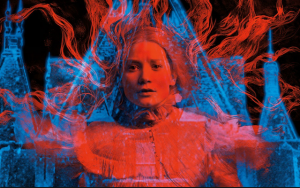 Bloody and by times bloody terrifying, every frame of “Crimson Peak” drips with Guillermo del Toro’s Grand-Guignol sensibility. Madness and murder are front and center, coupled with arch performances—Chastain in particular embodies the Hammer Horror style of wild-eye-acting—and the director’s flawless instinct for creating unease in the audience. It’s a transport to another world, a place where the ground seeps red and old houses moan in the wind. With atmosphere to burn it’s an operatic companion piece to “The Devil’s Backbone” and “Pan’s Labyrinth” that plays like a fever dream.
Bloody and by times bloody terrifying, every frame of “Crimson Peak” drips with Guillermo del Toro’s Grand-Guignol sensibility. Madness and murder are front and center, coupled with arch performances—Chastain in particular embodies the Hammer Horror style of wild-eye-acting—and the director’s flawless instinct for creating unease in the audience. It’s a transport to another world, a place where the ground seeps red and old houses moan in the wind. With atmosphere to burn it’s an operatic companion piece to “The Devil’s Backbone” and “Pan’s Labyrinth” that plays like a fever dream.
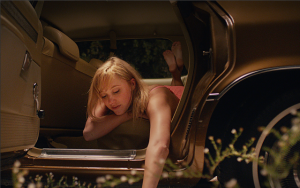 It would be easy to write “It Follows” off as a teen horror, but it is much more than that. It’s a study — and a creepy one at that — of teen angst filtered through primal dread — fear of the dark, being alone, apparitions — and physical fear. An anxiety inducing synthesizer score adds to the atmosphere of unease, making this one of the most unsettling and original horror movies of the year.
It would be easy to write “It Follows” off as a teen horror, but it is much more than that. It’s a study — and a creepy one at that — of teen angst filtered through primal dread — fear of the dark, being alone, apparitions — and physical fear. An anxiety inducing synthesizer score adds to the atmosphere of unease, making this one of the most unsettling and original horror movies of the year.
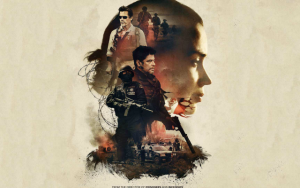 “Sicario” (it means “hitman” in Spanish) begins with a tightly wound sequence and doesn’t go slack for the next ninety minutes. Director Denis Villeneuve has made a slow burn of a film, deliberately paced, that weaves complex quasi-morality with a sense of hopelessness into an edge of your seat story.
“Sicario” (it means “hitman” in Spanish) begins with a tightly wound sequence and doesn’t go slack for the next ninety minutes. Director Denis Villeneuve has made a slow burn of a film, deliberately paced, that weaves complex quasi-morality with a sense of hopelessness into an edge of your seat story.
“It Follows” is a hybrid of genres. It’s a scary film through and through, but it’s the dual horror of teenage boredom and ennui coupled with a strange and terrifying supernatural virus that is transmitted sexually. Coming of age and body/mind horror steeped together in an unholy mix and it is an effective brew.
Jay (Maika Monroe) is a typical, slightly bored teen living in a sleepy suburb of Detroit. There’s not much for the teens to do there except watch TV, hang out and have sex. After a one-night stand with Hugh (Jake Weary) Jay finds herself in trouble, but not “in trouble” as in pregnant. He has infected her with a curse that will cause her to see ghosts, terrifying, shape shifting visions like living nightmares that could drive her to the brink of madness. He tells her the only way to get rid of the virus is to pass it on by hitting the sack with someone else. Until then, he warns her not to let the “ghosts” touch her and “never go anywhere with only one exit.”
It would be easy to write ”It Follows” off as a teen horror, but it is much more than that. It’s a study—and a creepy one at that—of teen angst filtered through primal dread—fear of the dark, being alone, apparitions—and physical fear. An anxiety inducing synthesizer score adds to the atmosphere of unease, making this one of the most unsettling and original horror movies of the year.